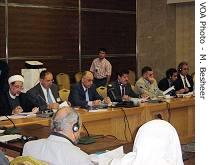2007年VOA标准英语-Experts Discuss Federalist System's Chance of S(在线收听)
Irbil
15 July 2007
One of the unanswered questions about Iraq's future is: can a federal system of government, one in which power is divided between a central government and regional or provincial ones, work in Iraq? VOA's Margaret Besheer talks to Iraqi and international figures in the northern Iraqi city of Irbil, where a conference took place this week to discuss Iraqi federalism.
In 2005 Iraq adopted a new constitution which enshrines the concept of federalism. But as sectarian differences threaten to divide the country, can federalism really keep it united?

Iraqi and international figures discuss federalism in Iraq
Absolutely, says Egyptian human rights activist Saad Eddin Ibrahim, one of the participants at a week-long conference on federalism in Iraq's Kurdistan region.
"Federalism is not utopia, it is not a panacea," said Ibrahim. "Federalism is not perfect, it has its problems, but it is better than fighting each other and then one group subjugating the others."
Iraq is home to Shiites, Sunni Arabs, Kurds and many smaller groups, such as Assyrian Christians and ethnic Turkmen. Arabic is the official language, but Kurdish is also widely spoken, especially in the northern Kurdistan autonomous region.
Iraqi Kurdistan is flourishing politically and economically and is often held up as Iraq's biggest success story. Conference organizer Bakhtiar Amin says the rest of the country can learn from the Kurdish experiment with federalism.
"How they [the Kurds] faced different challenges and difficulties; how they overcame some of these, and to learn also from the experiences of other federal systems around the world," said Amin.
Experts from four continents attended the conference and shared their views.
Paul Dewar, a member of Canada's parliament from Ottawa, notes that his country shares similarities with Iraq in that it also has two languages, two main religions, and significant oil resources which must be shared among several provinces.
"Canada actually has a relevant model; it is not a matter of one size fits all, and federalism is different in different political contexts, but it seems to me that Canada is one that makes infinite sense to look at," said Dewar.
Canada has a central parliament and 10 provincial legislative assemblies with a relatively high degree of autonomy. The Canadian constitution was written to take into account the colonial distinction between French- and English-speaking regions and their cultures.
Iraqi parliamentarian Mahmoud Othman cautions that many Iraqis still do not understand the concept of federalism. He also wonders if it might be too soon to try to get them to embrace it.
"Somebody who gets up in the morning he has no gas, no electricity, no safety, no food, unemployed, do you think he will listen to you when you talk about federalism or our constitution? It is nonsense. They have been working in the wrong way in this country," said Othman.
He says the government must first guarantee a minimum of security and basic services to the people before talking to them about federalism.
The conference, sponsored by two international human rights groups and with support from the Italian and Kurdish governments, brought together many Iraqi political figures from the Shiite and Kurdish communities, but Sunni Arabs were notably absent.
Several were invited, but only two attended as the others stayed in Baghdad to deal with the political crisis relating to the removal of the Sunni Arab speaker of parliament.